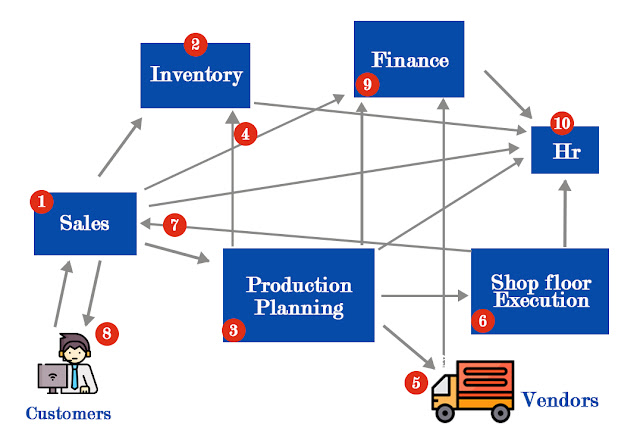Why do we need SAP ERP?
Each business holds its objectives and goals, procedures, and requirements. most significantly , the present businesses require innovative technologies with complete functions that fill the gap between business processes and folk . a corporation has several departments and teams, so on run them successfully; there should be an ERP system that supports them by coordinating all information and communication within the organization. An ERP system may be a grouping of software, and therefore the company’s activities administered to accomplish various operations. ERP software helps to regulate the whole project value chain and also simplifies the critical processes effectively and efficiently.
Presently,
SAP ERP is one among the powerful Enterprise Resource Planning systems. SAP
stands for Systems, Applications, and Products within the processing . within
the year 1972, Wellenreuther, Hopp, Hector, Plattner, and Tschira founded SAP
software. SAP system includes various integrated modules, which covers most the
feature of the business management. Since 2010, SAP has quite 140,000
installations globally, over 25 industry-specific business solutions, and quite
seventy-five thousand of consumers in 120 countries.
 |
| SAP ERP System |
Need for an ERP
system:
Well,
any beginner who wants to form a career in SAP ERP is enthusiastic to
understand about the ERP system, and therefore the very first question which
arises to their mind is why an ERP system is required? To answer this question
allow us to consider a scenario:
A
customer wants to get a selected product. Thus, the contacts with the sales
division of an enterprise- the sales team’s links with the inventory team to
see the product’s availability. But, unfortunately, that product is unavailable
and therefore the organization loses the sale. to form sure that this won’t
rehash next time; the organizations are using ERP software. allow us to see how
an ERP system overcomes these issues. But before learning about ERP systems
allow us to understand how various departments are involved within the entire
business process. The step by step procedure is mentioned below:
1.
A customer approaches the sales division to see the product’s availability.
2.
Then the sales teams link to the inventory department to see whether the actual
product is out there or not.
3.
If the merchandise is unavailable, the sales team connects to the assembly
planning department and asks them to manufacture the merchandise .
4.
Next, the assembly planning team connects again with the inventory department
to see the supply of staple .
5.
If the staple is unavailable, the assembly planning team purchases it from the
wholesalers.
6.
Then the assembly planning team moves the raw materials to the workplace
execution for the creation of an actual product.
7.
Once the merchandise is prepared , the workplace team sends it to the sales
team.
8.
The sales team, in turn, delivers the precise product to the client.
9.
Meanwhile, the sales team informs the finance department regarding the income
generated by the sale of the merchandise . Production planning team then update
the finance team with payments to be done to different vendors for raw
materials.
10.
The HR department is additionally involved within the complete process to
require care of any HR-related issue.
This
is the standard business process that any manufacturing company follows. Below
are a couple of essential points which will be derived from the above scenario:
A
company has different subdivisions or business units.
These
subdivisions or business units communicate with one another continuously and
exchange information with one another .
An
organization becomes successful by communicating and transferring data within
departments, also as related third-party like vendors, clients, etc.
The
enterprise are often classified as a decentralized and centralized system as
per the communication and data exchanged is accomplished.
SAP ERP may be a sort
of centralized system which most of the organizations are utilizing currently.
Advantages of Centralized System:
· SAP ERP software may be a centralized enterprise management system.
· The centralized system removes the duplication, gaps, and redundancy in data.
· It provides information across all departments in real-time.
· SAP ERP system provides control over different business processes.
· The centralized system enhances productivity, provides better inventory management, endorses quality, decreases staple cost, effective HR management, reduces expenses, and enhances profits.
· With a centralized system, the organizations can recover customer communication and thus improves throughput. It also helps to enhance customer service.
Best Online Career Organization
brings to you its knowledge and expertise of over 18+ years’ in SAP online
training and SAP consultancy. We empower student graduates and young
professionals with the required SAP know how to power-boost their careers. We
tend to your learning needs with the utmost sense of urgency and dedication.
Contact Us:
Comments
Post a Comment